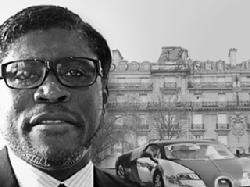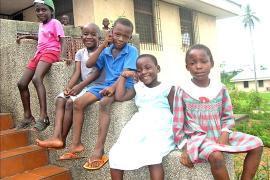Action: Equatorial Guinea: Fears for health of detained female activist Act By: 9/14/2013 Sponsor: Amnesty International Other Contact Info: UrgentAction@amnesty.ca Action Site: http://www.amnesty.ca/urgentaction/ African Charter Article# 12: Every individual shall have the right to freedom of movement and residence, the right to leave any country, and to seek asylum. Summary & Comment: When Clara Nsegue Eyi protested the violation of her right under Article 13, Universal Declaratio! n of Human Rights to freedom of movement and residence within the borders of each state, authorities detained her. She now requires urgent medical assistance. Please intervene with messages to targets below. JS (read more)
|
Equatorial Guinea: Visiting Leaders Should Press for Rights - Country's Citizens Denied Free, Fair Elections
By Human Rights Watch
18 February 2013
PRESS RELEASE (Washington, D.C.) Latin American and African officials participating in a cross-regional meeting in Equatorial Guinea should press their host, President Teodoro Obiang Nguema Mbasago, to undertake serious human rights and democratic reforms ahead of planned parliamentary elections in May, 2013. President Dilma Rousseff of Brazil, among other officials, is anticipated to attend the Africa-South America Summit scheduled for February 20-23.
President Obiang is the world's longest-ruling head of state. He has claimed at least 95 percent of the vote in the five presidential elections since he seized power in 1979 - elections marred by irregularities, intimidation, and voter fraud. His ruling party and its allies control 99 of the country's 100 seats in parliament. Constitutional changes approved in November 2011 strengthened the president's already considerable powers. Under the revised constitution, the country is to create a bicameral parliament by adding a 75-member Senate. Obiang will directly appoint 15 of its members. Elections to name the remaining legislators and fill municipal posts have been called for May 26. (read more)
|
 |
| Credit: The New York Times |
|
Genocide Warning: Equatorial GuineaBy Genocide Watch 21 February 2012, updated 25 April 2012
Equatorial Guinea gained independence in 1968. Ever since this small African country has suffered under authoritarian rule.
The first president was Francisco Macías Nguema. After his election in September 1968 he installed a single-party system and assumed all powers, including the legislature and the judiciary. During his bloody rule approximately one third of the population was either exiled or murdered, targeting in particular the Bubi people. President Macías Nguema was notorious for his arbitrary executions of entire villages and families. He held mass executions in football stadiums while loudspeakers blared "Those were the days my friend. We thought they'd never end." In 1979 he was overthrown by his nephew, Teodoro Obiang Nguema Mbasogo. The former president was put on trial and executed. The charges included the crime of genocide.
The change of power did not improve the situation for the population of Equatorial Guinea. Its human rights record is abominable and characterized by torture, arbitrary executions, lack of freedom of expression and association and corruption. Freedom House identifies Equatorial Guinea as one of the nine least free countries in the world.
Since oil reserves have been discovered in Equatorial Guinea its GDP has increased enormously to $14 billion (2010) annually. However, due to kleptocracy and nepotism this oil wealth has not reached the majority of the population. In this regard, France has recently opened investigations into money laundering practices of President Obiang Nguema's son. Genocide Watch fully supports Human Rights Watch's demand that the French government issue an international arrest warrant for him.
There is deep ethnic division in Equatorial Guinea, and also clan division within ethnicities. The majority of the population belong to the Fang group. Within this group there are clans. President Obiang Nguema favors his own clan, the Esangui.
The Bubi people represent the minority ethnicity and are indigenous to Bioko Island. They are subject to systematic discrimination and persecution by the government, and were the main victims of the genocide carried out by president Macías Nguema from 1978 - 1979.
Genocide Watch closely monitors the situation of repression in Equatorial Guinea. Early warning signs of potential genocidal massacres are the following:
- There have been previous genocidal massacres of the Bubi minority under former president Macías Nguema (1968-1979), but he was the only person tried for them.
- The Bubi minority is discriminated against and persecuted. This practice has increased during recent years. In 2006, President Obiang Nguema denounced the tradition of appointing a prime minister from the Bubi group.
- Nepotism and kleptocracy mean that the nation's oil wealth has mostly benefited the president's family and the Esangui clan of the Fang group. This has created an ethnically polarized elite. The resulting income inequality is enormous.
Genocide Watch considers Equatorial Guinea to be at early warning stage 6: Preparation for potential massacres.
Genocide Watch denounces the decision of UNESCO to award a prize sponsored by President Obiang Nguema, even though the prize will no longer expressly feature his name.
Relevant information should be sent to Equatorialguinea@genocidewatch.org.
|
 |
| Sitting outside, SOS Children's Village Bata |
|
|
AFRICA: High cost of child trafficking
By IRIN Humanitarian News and Analysis 25 January 2012
POINTE NOIRE, 25 January 2012 (IRIN) - Forced child labour remains rampant in Central Africa, where poverty fuels the trafficking of children from poorer countries to oil-rich states such as Gabon, Equatorial Guinea and the Republic of Congo, according to experts. In Equatorial Guinea, children “…are believed to be exploited in Malabo and Bata where a burgeoning oil industry creates demand for cheap labour and commercial sexual exploitation” ( read more).
|
Updates
24 June 2012," Police troops stop Equatorial Guinea protest", By Afrol News
8 May 2012, "Tres años de carcel para lider opositor de Guinea" by Afrol News
25 April 2012 "Updated country profile of Equatorial Guinea," by Genocide Watch
27 March 2012 "Biens mal acquis: mandat d'arrêt requis contre le fils du pésident Obiang," by AFP, LeMonde.fr
8 March 2012 "Unesco backs dictator's divisive price," by Scott Sayare, The New York Times
21 February 2012 "Country profile of Equatorial Guinea," by Genocide Watch
29 January 2012 "When dictators, kleptocrats and football get together," by Kamau Mutunga, The Monitor
13 January 2012 "Soccer co-host violates rights: government seeks new image without reform," by Human Rights Watch
4 October 2011 "Unesco delays decision on fate of prize sponsored by dictator," by Scott Sayare, The New York Times
30 May 2011 "US engages with an iron leader in Equatorial Guinea," by Adam Nossiter, The New York Times
27 April 2009 "Rights Group: Guinea Soldiers Rob, Extort," by The Associated Press
4 April 2009 "EGuinea coup prisoner freed on health grounds," by Agence France Presse
28 March 2009 "Eon leads new European dash for African gas," by Matthew Green, The Financial Times Limited
27 March 2009 "Equatorial Guinea aims to become shipping hub, to double port capacity," by David Lewis
26 March 2009 "As Chinese Investment in Africa Drops, Hope Sinks," by Lydia Polgreen, The New York Times
8 March 2009 "West Africa: World Briefing of Equatorial Guinea And Nigeria," by Paul Ohia
26 March 2009 "EQUATORIAL GUINEA REAFFIRMS ITS COMMITMENT TO HUMAN RIGHTS," by Malabo
25 March 2009 "Equatorial Guinea: Arrest and torture of political opponents following February attack on presidential palace," by Amnesty International, Public Statement
23 March 2009 "Central Africa: Cameroon-Equatorial Guinea Border Sealed," by Francis Tim Mbom, The Post
11 March 2009 "Undue Diligence: How Banks Do Business with Corrupt Regimes," by Global Witness
25 February 2009 "Equatorial Guinea fires security chiefs after clash," by David Lewis, Reuters
|
|